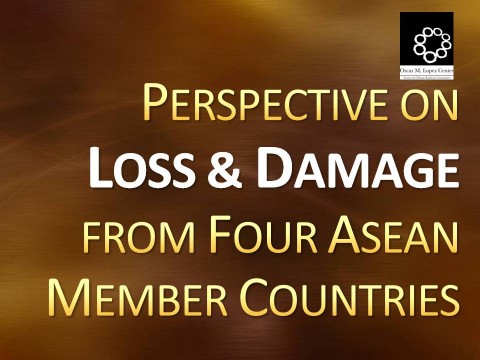PERSPECTIVE ON LOSS AND DAMAGE FROM FOUR ASEAN MEMBER COUNTRIES

COP 21: Demanding for a Cleaner World
December 11, 2016
Here comes the rain again
December 11, 2016Last April 19-20, 2016 in Bogor, Indonesia, experts and researchers from Indonesia, the Philippines, Thailand and Vietnam came together at a workshop to discuss loss and damage, and its vital link to climate change adaptation (CCA) and disaster risk reduction (DRR).
The recognition of Loss and Damage as a distinct issue is one of the significant achievements of the Paris Agreement. In the past, it has often been relegated as a subcategory of adaptation. But the realities of climate change today point to the fact that there are some climate change impacts “that people cannot cope with or adapt to.” (Warner and van der Geest, 2013)
|
Loss and damage (L&D) of this kind is more often seen in countries like the Philippines and its Asian neighbors, which are rendered highly vulnerable to weather or climate-related hazards such as floods, storms, rainfall-induced landslides and droughts. Their high reliance on agriculture and natural resources contribute to this vulnerability, therefore findings ways to address L&D associated with climate change impacts is most needed.
It is this shared exposure and risk to the same hazards that the need for a regional approach can prove most useful and relevant. As Dr. Emilia Visco, Professor from the University of the Philippines Los Baños said, “Disasters are borderless. [They] transcend national boundaries.” A regional framework that integrates loss and damage in CCA and DRR to reduce vulnerability, increase resilience and avoid or minimize potential losses and damages is a good start as it opens up synergies and opportunities in building a stronger and more resilient [ASEAN] community, added Dr. Rodel Lasco, world renowned scientist and Scientific Director of the Oscar M. Lopez Center.
At the workshop, the four countries developed a framework that promotes the use of L&D assessment methods such as scenario building, valuation of resources and cost-benefit analysis, as basis to improve action plans with CCA-DRR strategies. It also caters to both extreme weather (tropical cyclone, flooding, etc.) and slow-onset events (rising temperature, increasing sea water levels, etc.), incorporating the predictive and reactive nature of the adaptation process to emphasize the need to consider uncertainties in designing plans and strategies.
The goal is to influence policy-makers to acknowledge and mainstream L&D information as an essential component in creating effective action plans that will increase resilience, decrease vulnerability, and reduce further loss and damage in order to build back better communities and ecosystems.
Entitled “Regional Workshop on Loss and Damage (L&D), Climate Change Adaptation (CCA), and Disaster Risk Reduction (DRR) in Southeast Asia,” the workshop is part of the Year 2 activities of a project funded by the Asia-Pacific Network for Global Change Research (APN) and headed by the Oscar M. Lopez Center, with collaborators from Indonesia, Thailand, and Vietnam. (Click here for more information on the project.)
Later this year, a science policy forum and lecture series will be held simultaneously in the Philippines, Indonesia, and Vietnam, to disseminate the results of the project, provide recommendations, and close the science-policy-action gaps.
Weak L&D in Southeast Asian Countries
In a study led by the Center, the four countries represented at the workshop assessed the state of L&D system in their respective homelands. The results showed that either they have just started institutionalizing L&D in their government systems, or they have no established L&D system yet (e.g. only damages). Moreover, a number of knowledge gaps and challenges (availability of data, standardization, coordination, and technical capacity, among others) have been identified in the systems, especially at the local level.
For more information, visit www.omlopezcenter.org.

